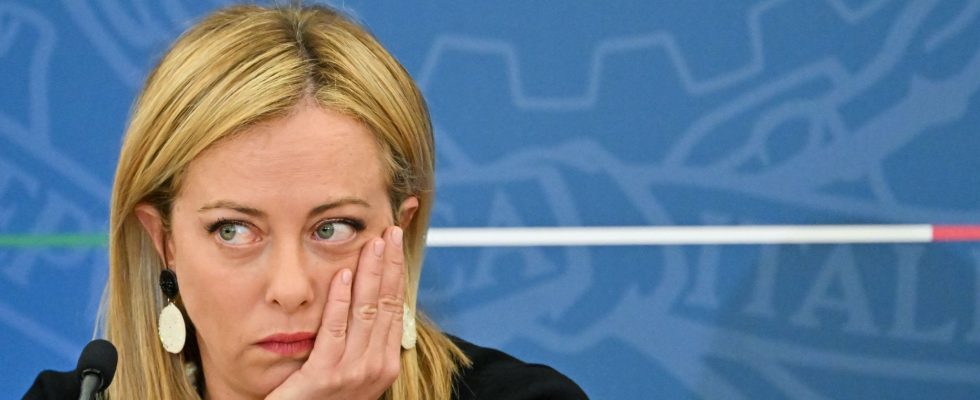Noria of coastguard helicopters flying over NGO ships in the middle of the Mediterranean, piers where migrants are massed wrapped in thermal blankets, unaccompanied minors sleeping in makeshift camps in Trieste… Images of the migration crisis are are once again making headlines in the transalpine media at the end of summer. Over the first eight months of the year, the number of migrants who reached the coasts of the peninsula stood at 113,500, more than double than in 2022, at the same period. On August 27 alone, almost a hundred landings were recorded, allowing more than 4,000 people to land in Lampedusa. The highest number ever recorded for an island whose accommodation center, already saturated, can only accommodate 600 people.
“The situation is unmanageable, considers its mayor, Filippo Mannino. The state of migratory emergency decreed last spring has been useless. None of the problems that we have been facing for years have been solved. Giorgia Meloni should come on the island to see our difficulties!” Invitation declined by the President of the Council, who had nevertheless multiplied trips to the other side of the Mediterranean to honor her promise to put an end to these irregular arrivals. But the failure is obvious: they jumped 103% this year. In Trieste, more than 500 unaccompanied minors have been sleeping in the street in recent days. “I have been dealing with issues related to migrants since the 1990s, I have seen everything and more, but I could not imagine such a thing, comments its mayor Roberto Dipiazza, who nevertheless supports the current government. The city is in state of emergency in the face of an invasion of migrants.”
Upon coming to power, Giorgia Meloni abandoned these polemical remarks, as did her idea of establishing a naval blockade of the North African coasts. “It has become institutionalized and has understood that the magic wand does not exist, notes Nathalie Tocci, director of the Institute of International Affairs in Rome. But the current figures for the migration crisis are merciless even though it is its main hobbyhorse. She made two mistakes. First, she obtained nothing from Brussels to reform the Dublin regulation relating to the management of asylum and migration. On the contrary, she even showed herself understanding towards his Polish allies Mateusz Morawiecki and Hungarian Viktor Orban who refuse to participate in the European mechanism for distributing migrants! His other mistake is to have wanted to outsource the management of migratory flows. It is an old recipe which has never worked, except in 2016 with Turkey.”
Salvini tries to take advantage of the migration crisis
After three trips by Giorgia Meloni to Tunis to visit her “friend” President Kaïs Saïed, a “strategic partnership” centered on the fight against immigration was thus signed in July between Tunisia and the EU, which is committed to provide aid of 105 million euros to fight against smugglers. Since then, the number of arrivals from Tunisia has exploded by 386%. Interior Minister Matteo Piantedosi himself deplores “collaboration still insufficient to curb this worrying urgency of arrivals”.
However, “these figures are incommensurate with the 800,000 arrivals that Greece had to manage in 2015, tempers Flavio di Giacomo, spokesperson for the International Organization for Migration. The crisis is above all humanitarian, since migrants sub-Saharan Africans flee Tunisia where they suffer violence and abuse. But it is also logistical. The decline in recent years has justified the elimination of more than 40,000 places in reception centers. “It is difficult to explain the situation to public opinion,” admitted Giorgia Meloni during the back-to-school Council of Ministers. “We must confront the problem pragmatically, with rapid and coordinated decisions to avoid the dispersion of efforts and Resource.”
The admission of a certain confusion. As proof, Meloni announced that she would herself take charge of coordination within the Interministerial Committee for the Security of the Republic, which, among its members, includes the Minister of Infrastructure, a certain Matteo Salvini. As the European elections approach, he is doing everything to distance himself from Giorgia Meloni and attract the most radical section of the electorate disappointed by his rival’s moderation. Against his opinion, he supported a general in the Italian army, who has just published a book in which he sets out a pessimistic vision of contemporary society peppered with openly racist and homophobic remarks. For Salvini, the migration crisis is therefore an opportunity for new skirmishes. “I think that a new decree on security is necessary from September, because Italy cannot be a point of arrival for migrants coming from the other side of the world,” he insists. Since Italy sends billions of euros to Brussels every year, the defense of Italy’s borders must be a European priority.”
A Council of Ministers on the migration issue will take place in the coming days. It looks stormy. “The tension will be growing, predicts Nathalie Tocci. Matteo Salvini has a free hand to embody the opposition on the migration issue, especially since the left, unable to take advantage of Meloni’s failure, is inaudible on this subject.” We can therefore expect new outrages from the head of the League, as in the years 2018-2019, when he was at the height of his political power. Already, the President of the Republic, Sergio Mattarella, has called on the entire political class to renounce hatred when addressing the subject of immigration.
